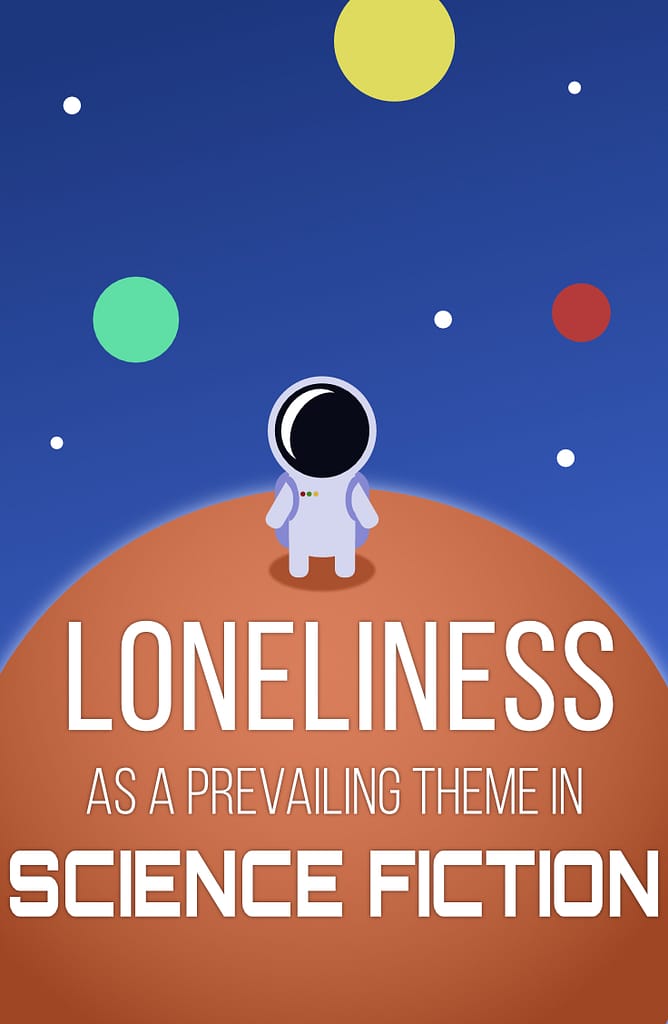I've been getting some sci-fi reading under my belt these days after spending a couple of years reading and reviewing fantasy series like Ranger's Apprentice. The switch in my reading list is intentional since I'm writing a new series set in space that's rife with starships, bounty hunters, and epic battles. To prepare myself for the deep dive into the genre, I've started books like Vaughn Heppner's A.I. Destroyer and watch movies like Interstellar, The Martian, and Guardians of the Galaxy. As I'm reading and watching, I'm noticing that loneliness in science fiction is a prevailing theme and it plays a huge role in the development of the main protagonist(s) in every story.
Only the Lonely
Early science fiction works really nail down the the loneliness felt by the main character of a story. Thinking specifically of books like The Time Machine and Mary Shelley's Frankenstein, we see both the Time Traveller and Dr. Victor Frankenstein grapple with the loneliness brought upon by the success of their experiments. In Time Machine, the protagonist propels himself into a bleak future Earth where every relationship, social custom, and environment he has known is no longer existent. Though he finds a measure of companionship with a woman named Weena for a time, she ends up perishing in a fire and he is alone again.
Similarly, in Frankenstein, we see the loneliness of two characters at odds with each other: Dr. Frankenstein and the creature. Frankenstein experiences loss and loneliness throughout the story as his creation destroys everything he holds dear--his reputation, his friends, his wife, and in the end, his very life. From the creature's perspective, we see loneliness and isolation driving the monster's rage. Even though Shelley's novel is considered more of a horror story, it still can be classified as science fiction and give plenty of insight into the genre's fascination with this theme.

The Nature of Isolation
Characters who are isolated in science fiction tend to give readers more investment in the stakes of the story. When the hero or heroine are alone with little or no support from other characters, it puts them at a disadvantage. From a fiction standpoint, this usually makes them an underdog because they are fighting their internal and external conflicts alone. And who doesn't love a good underdog story.
But the theme of loneliness isn't isolated (see what I did there?) to just the science fiction genre. We see this theme pop up in thrillers and mysteries aplenty, yet to me it seems more compelling in science fiction. Why is that?
I would guess that it's because dystopian futures, uncharted planets, and the sheer immensity of outer space all have a sense of foreboding. Science, in its purest form of data and research, tends to be cold and removed from human emotion. It just is regardless of how we feel about it. A thread of that finds its way into science fiction. Whenever you read about maniacal AI, crazy genetic experiments, and colonization of distant worlds, the stories that are memorable are the ones that have warmth and a human element despite all of the alien creatures and environments.
Characters who are isolated in science fiction tend to give readers more investment in the stakes of the story.
When the hero is removed from that warmth and humanity in a lonely state at the start of the story, the journey back to it is immensely satisfying to the reader. We see this particular plot element in a sub-genre of sci-fi that could be called "last man on earth" stories.
The Last Man
Bert Ehrmann has already written a fascinating article on this sub-genre dealing with loneliness in science fiction, so I'll sum up his thoughts with my own.
Last man stories are fairly common in science fiction and often involve a devastating collapse of civilization either on Earth or another planet. As its namesake implies, there is usually a single man or woman who survive the catastrophe until they find out there are more survivors and strive to re-establish contact with them somehow. One of the most famous tales of this kind is I Am Legend where Robert Neville finds himself alone after a worldwide virus has turned the rest of humanity into zombie-like mutants.
These stories dig deep into a character's motivations and psyche. As the reader, you sympathize with Neville when he nearly sacrifices himself to save his dog from the mutants. The dog is his only companion in this bleak reality and the last link to any semblance of the life he had prior. To abandon the pup is to abandon his humanity and nobody wants that.

Although it's quite easy to tell the difference between a story like I Am Legend and say, Star Wars, you still see the isolationism and loneliness in both of these sci-fi tales. At the beginning of A New Hope, we find Luke isolated on Tatooine, looking out toward the double suns for some greater adventure than his meager existence. The loneliness here isn't external, but internal. He longs for a grander purpose and joining the Rebellion offers the solution. But as the story progresses, there is still a sense of isolation from his real father and his true calling as a jedi.
I might be reading more into the loneliness theme than George Lucas ever intended, but I believe the science fiction genre lends itself well to it. Aren't the best sci-fi books and movies those where we follow a hero who is longing for connection in a planet devoid of life (The Martian) or a ship who's lost its crew to an alien threat (Alien) or even in a video game reality (Ready Player One)?
I'd love to hear your thoughts on this theme. Please leave a comment below.


